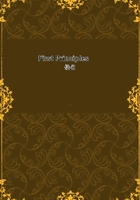
第34章
As thus constituted, Religion was and has ever been more or less irreligious;and indeed continues to be largely irreligious even now. In the first place(restricting ourselves to Religion in its more developed form), it has allalong professed to have some knowledge of that which transcends knowledge,and has so contradicted its own teachings. While with one breath it has assertedthat the Cause of all things passes understanding, it has, with the nextbreath, asserted that the Cause of all things possesses such or such attributes-- can be in so far understood. In the second place, while in great partsincere in its fealty to the great truth it has had to uphold, it has oftenbeen insincere, and consequently irreligious, in maintaining the untenabledoctrines by which it has obscured this great truth. Each assertion respectingthe nature, acts, or motives of that Power which the Universe manifests tous, has been repeatedly called in question, and proved to be inconsistentwith itself, or with accompanying assertions. Yet each of them has been ageafter age insisted on. Just as though unaware that its central position wasimpregnable, Religion has obstinately held every outpost long after it wasobviously indefensible. And this introduces us to the third and most seriousform of irreligion which Religion has displayed; namely, an imperfect beliefin that which it especially professes to believe. How truly its central positionis impregnable, Religion has never adequately realized. In the devoutestfaith as we commonly see it, there lies hidden a core of scepticism; andit is this scepticism which causes that dread of inquiry shown by Religionwhen face to face with Science. Obliged to abandon one by one the superstitionsit once tenaciously held, and daily finding other cherished beliefs moreand more shaken, Religion secretly fears that all things may some day beexplained; and thus itself betrays a lurking doubt whether that IncomprehensibleCause of which it is conscious, is really incomprehensible.
Of Religion then, we must always remember, that amid its many errors andcorruptions it has asserted and diffused a supreme verity. From the first,the recognition of this supreme verity, in however imperfect a manner, hasbeen its vital element; and its chief defects, once extreme but graduallydiminishing, have been its failures to recognize in full that which it recognizedin part. The truly religious element of Religion has always been good; thatwhich has proved untenable in doctrine and vicious in practice, has beenits irreligious element; and from this it has been undergoing purification. §29. And now observe that the agent which has effected the purificationhas been Science. On both sides this fact is overlooked. Religion ignoresits immense debt to Science; and Science is scarcely at all conscious howmuch Religion owes it. Yet it is demonstrable that every step by which Religionhas progressed from its first low conception to the comparatively high onenow reached, Science has helped it, or rather forced it, to take; and thateven now, Science is urging further steps in the same direction.
When we include under the name Science all definite knowledge of the orderexisting among phenomena, it becomes manifest that from the outset, the discoveryof an established order has modified that conception of disorder or undeterminedorder, which underlies every superstition. As fast as experience proves thatcertain familiar changes always present the same sequences, there beginsto fade from the mind the conception of special personalities to whose variablewills they were before ascribed. And when, step by step, accumulating observationsdo the like with the less familiar changes, a similar modification of belieftakes place respecting them.
While this process seems to those who effect it, and those who undergoit, an anti-religious one, it is really the reverse. Instead of the specificcomprehensible agency before assigned, there is substituted a less specificand less comprehensible agency; and though this, standing in opposition tothe previous one, cannot at first call forth the same feeling, yet, as beingless comprehensible, it must eventually call forth this feeling more fully.